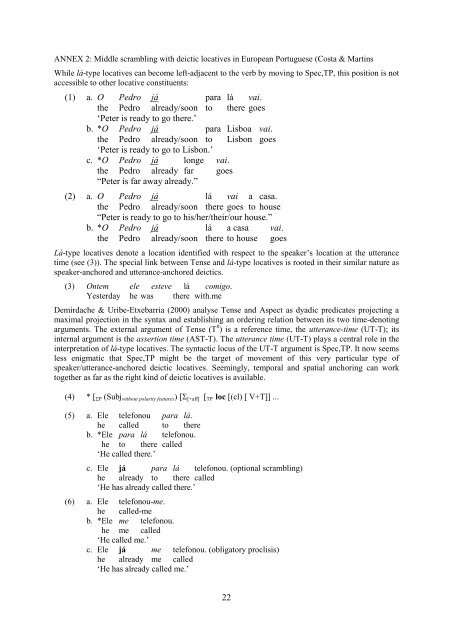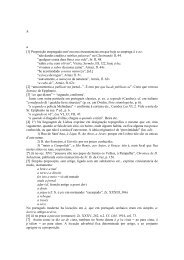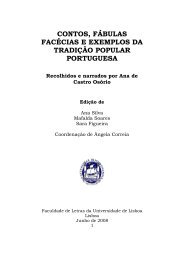1 Ana Maria Martins (University of Lisbon – FLUL/CLUL) Freie ...
1 Ana Maria Martins (University of Lisbon – FLUL/CLUL) Freie ...
1 Ana Maria Martins (University of Lisbon – FLUL/CLUL) Freie ...
You also want an ePaper? Increase the reach of your titles
YUMPU automatically turns print PDFs into web optimized ePapers that Google loves.
ANNEX 2: Middle scrambling with deictic locatives in European Portuguese (Costa & <strong>Martins</strong><br />
While lá-type locatives can become left-adjacent to the verb by moving to Spec,TP, this position is not<br />
accessible to other locative constituents:<br />
(1) a. O Pedro já para lá vai.<br />
the Pedro already/soon to there goes<br />
‘Peter is ready to go there.’<br />
b. *O Pedro já para Lisboa vai.<br />
the Pedro already/soon to <strong>Lisbon</strong> goes<br />
‘Peter is ready to go to <strong>Lisbon</strong>.’<br />
c. *O Pedro já longe vai.<br />
the Pedro already far goes<br />
“Peter is far away already.”<br />
(2) a. O Pedro já lá vai a casa.<br />
the Pedro already/soon there goes to house<br />
“Peter is ready to go to his/her/their/our house.”<br />
b. *O Pedro já lá a casa vai.<br />
the Pedro already/soon there to house goes<br />
Lá-type locatives denote a location identified with respect to the speaker’s location at the utterance<br />
time (see (3)). The special link between Tense and lá-type locatives is rooted in their similar nature as<br />
speaker-anchored and utterance-anchored deictics.<br />
(3) Ontem ele esteve lá comigo.<br />
Yesterday he was there with.me<br />
Demirdache & Uribe-Etxebarria (2000) analyse Tense and Aspect as dyadic predicates projecting a<br />
maximal projection in the syntax and establishing an ordering relation between its two time-denoting<br />
arguments. The external argument <strong>of</strong> Tense (T 0 ) is a reference time, the utterance-time (UT-T); its<br />
internal argument is the assertion time (AST-T). The utterance time (UT-T) plays a central role in the<br />
interpretation <strong>of</strong> lá-type locatives. The syntactic locus <strong>of</strong> the UT-T argument is Spec,TP. It now seems<br />
less enigmatic that Spec,TP might be the target <strong>of</strong> movement <strong>of</strong> this very particular type <strong>of</strong><br />
speaker/utterance-anchored deictic locatives. Seemingly, temporal and spatial anchoring can work<br />
together as far as the right kind <strong>of</strong> deictic locatives is available.<br />
(4) * [P (Subjwithout polarity features) [[+aff] [TP loc [(cl) [ V+T]] ...<br />
(5) a. Ele telefonou para lá.<br />
he called to there<br />
b. *Ele para lá telefonou.<br />
he to there called<br />
‘He called there.’<br />
c. Ele já para lá telefonou. (optional scrambling)<br />
he already to there called<br />
‘He has already called there.’<br />
(6) a. Ele telefonou-me.<br />
he called-me<br />
b. *Ele me telefonou.<br />
he me called<br />
‘He called me.’<br />
c. Ele já me telefonou. (obligatory proclisis)<br />
he already me called<br />
‘He has already called me.’<br />
22





